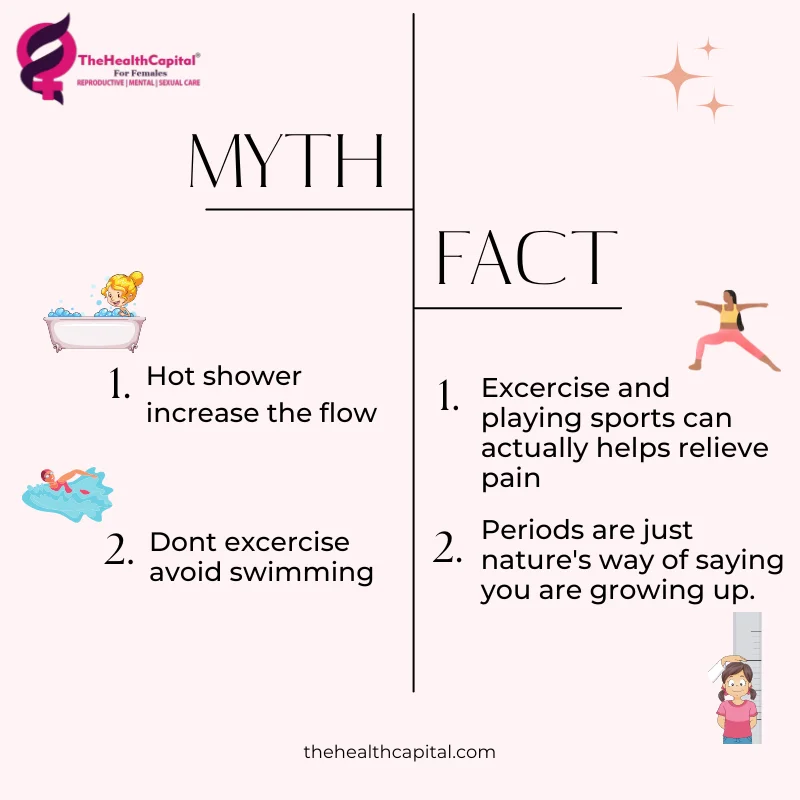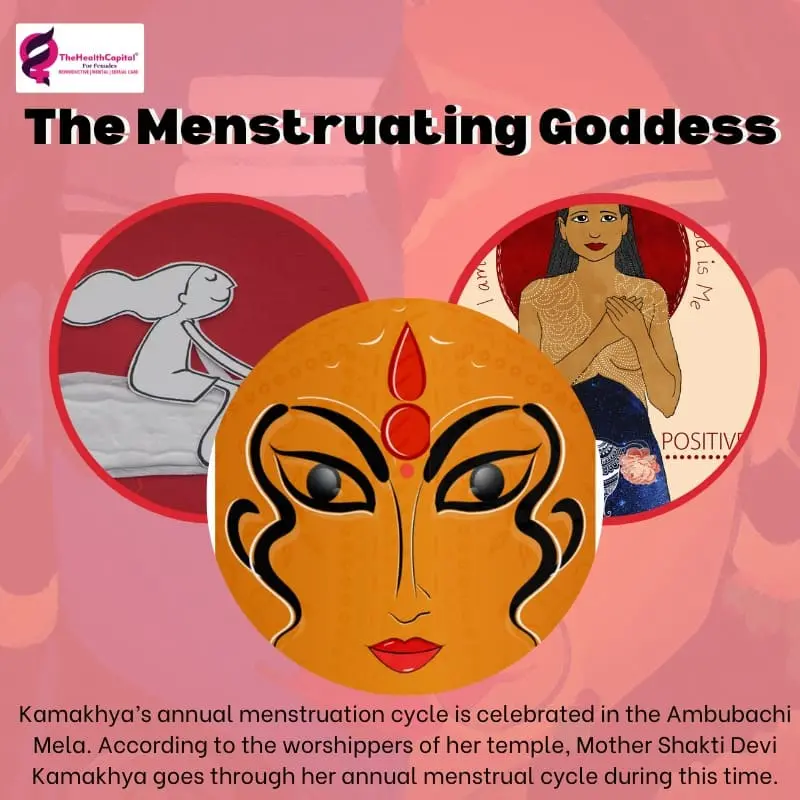The deity temple of Kamakhya Devi is located on Nilachal Hill in Guwahati. The goddess is referred to as the bleeding goddess. During June (Aashad), she bleeds and the river Brahmaputra near Kamakhya turns red. Many noteworthy things must be deliberated upon and put in the spotlight. Studies have shown that many women have been diminished to a position of humiliation or un-belongingness.
“The use of sanitary pads and the dos and don’ts should be discussed with openness so as to make a hygienic and healthy life for the women.”
Manushi Chhillar
Busting period myths in India through the example of the menstruating goddess is the goal of this particular piece of information. The Health Capital believes in women’s health and advocates the improvement of women’s health. Therefore, period myths need to be busted. The temple of Kamakhya Devi and the procession that follows it will be discussed in detail, but more importantly, the various aspects of the menstruating goddess are the focus of this week’s blog.
What and Why Period Myths?
It comes as no shock when we say this- periods are normal, yet one of the most stigmatized ‘issues’ in the world. The fact that periods must be categorised as an issue in today’s world is in itself a testimony to this sad state of affairs. The thought process that has led our beloved society to limit its thinking needs a change.
What is menstruation?
Menstruation is natural. But many people forget to understand the naturality of menstruation. So it’s important to address what menstruation is and why it occurs. It is vaginal bleeding that happens every month. It is a normal and healthy process that prepares a woman for pregnancy every month. The lining of the uterus becomes thick, and when pregnancy doesn’t occur, it sheds its lining in the form of blood through the vagina. The problem arises when a woman does not get her period or faces some issues while menstruating.
What are period myths?
Myths are traditional beliefs that have originated from a thought process, probably a conservative one, or from stories that have been running around society. Many period myths have been passed down from generation to generation. Many of these interfere with a woman’s individuality, her mental health and many aspects of her body. Some of these are-:
- A very prominent myth or traditional custom in Indian society is that women who are in their period can’t cook food for someone else.
- Another one talks about the place of worship. Women, while menstruating, can’t enter a place of worship.
- An interesting myth says that women should wash their hair on the first day of their period, to purify themselves clean.
- On the contrary, another custom says that if a woman washes her hair, her flow will be less and it will affect fertility later in life.
- No scientific backing has been found for these myths. All these period myths stem from a thought process that views menses as an impure process.

Menstruation: Busting the Taboo
Menstruation is often associated with many backward and traditional thoughts. These thoughts make life difficult for women. The period is often associated with an evil spirit, embarrassment and shame. Why shall women feel bad for something that she has no control over, that is natural and necessary for their body and growth? Many social customs are prevailing in society. For example, when a woman is on her period, in some villages, she keeps away her menstruation clothes to prevent them from being possessed by an evil spirit. These myths and customs do nothing but stunt the mental growth of women.
The period is a natural process. But the myths and the conservative perspective on the period make it completely difficult for women to go on about their daily lives, during that time of the month.
“That time of the month”- many people even find it shameful to say ‘periods’. That’s how bad the situation is when it comes to menstruation, and the consequences are tolerated by women.

The Menstruating Goddess
Kamakhya’s annual menstruation cycle is celebrated in the Ambubachi Mela. According to the worshippers of her temple, Mother Shakti Devi Kamakhya goes through her annual menstrual cycle during this time. According to Hindu legend, devotees at the mela are granted entrance to Mother Earth’s “menses” during the monsoon rains, allowing them to access their supreme power.
It lasts for three days. Goddesses are believed to be menstruating during these three days of silence. Hence, the temple is shut down for the duration. Devotees also refrain from cooking, gardening, performing puja, or engaging in other religious practices throughout these three days.
Origination of the Menstruating Goddess
When Sati and her husband fought, she ignored him and went to the yajna. Daksa’s harshness was very much visible, and he ridiculed his daughter in front of everyone. Daksa also criticized Shiva. Sati could not tolerate this anymore, so she leapt into the yajna’s flames. When Lord Shiva learned of the incident, his rage went beyond all boundaries. She had been burned beyond recognition, and her husband was overcome with grief. Starting with the dance of destruction, known as “Tandava,” he began to ravage the planet.
Other gods were frightened by Lord Shiva’s power and rage. They realized that if it went on for a long time, the entire world would be destroyed. Lord Vishnu came up with a remedy after assessing the problem. To soothe the angry deity, he unleashed his chakra, which dismembered the body of Mother Sati. According to legend, Sati’s body was scattered over the land in 108 parts. Shakti Peeths are the names given to the sites.
Legend has it that when Lord Vishnu’s ‘Sudarshan Chakra’ pierced the body of Mother Sati, the vagina of Sati fell in Pragjyotishpur, presently known as Assam. The result of this was a temple dedicated to Devi Kamakhya.
The period is a Common Process
The Ambubachi festival is held during the monsoon to honour Goddess Kamakhya. She is believed to be going through her annual cycle of menstruation at the time. The temple, during this time, remains closed because it is believed that the goddess rests like the traditional women’s menstrual seclusion. Devotees do not cook, perform puja, or read holy books. The used utensils and clothes are symbolically purified by sprinkling water on the fourth day. After three days, the Goddess is worshipped after the cleaning ritual to ensure that the deity regains her impurity.
Even the goddess is considered to be impure during menstruation. However, periods are natural. And they are not impure. The sooner people understand, the better it will be. The period is not something that can be or should be eradicated. It is a natural process and deserves to be treated like one. Women must go through menstruation to prepare themselves for pregnancy.
Therefore, The Health Capital only wishes to provide a simple understanding in front of everyone. We can repeat this countless number of times- Period is natural. Women do not become impure during their periods. The sooner people understand this, the better it will be for the world. The only aim that The Health Capital wishes to fulfil is to make life easier for women.
FAQ’s
1. How can you feel relief while on your period?
Placing a hot water bottle on the lower back or lower abdomen. Massaging the abdomen, or exercising like yoga and walking to help increase blood flow.
2. What foods should you avoid when you are on your period?
Avoiding salty foods and excess sugar intake can be useful while one is on her period. Apart from this, coffee and alcohol should be avoided too.
3. Is it true that period blood is impure?
It is a myth that period blood is impure. Just like blood from any other area, it is completely normal. These period myths are primarily based on some thought process.
4. Is it true that Kamakhya Devi, the menstruating goddess, bleeds once a year?
Yes, indeed, Kamakhya Devi bleeds once a year, in June. The menstruating goddess bleeds annually which is followed by the Ambubachi festival.
5. How can one promote period hygiene?
Period hygiene is all about cleanliness. It is essential to maintain strict hand-washing with soap practices before and after changing sanitary products. Any bacteria on the hands and fingers prior to fitting a sanitary product can be transferred to the private part and cause infection.

